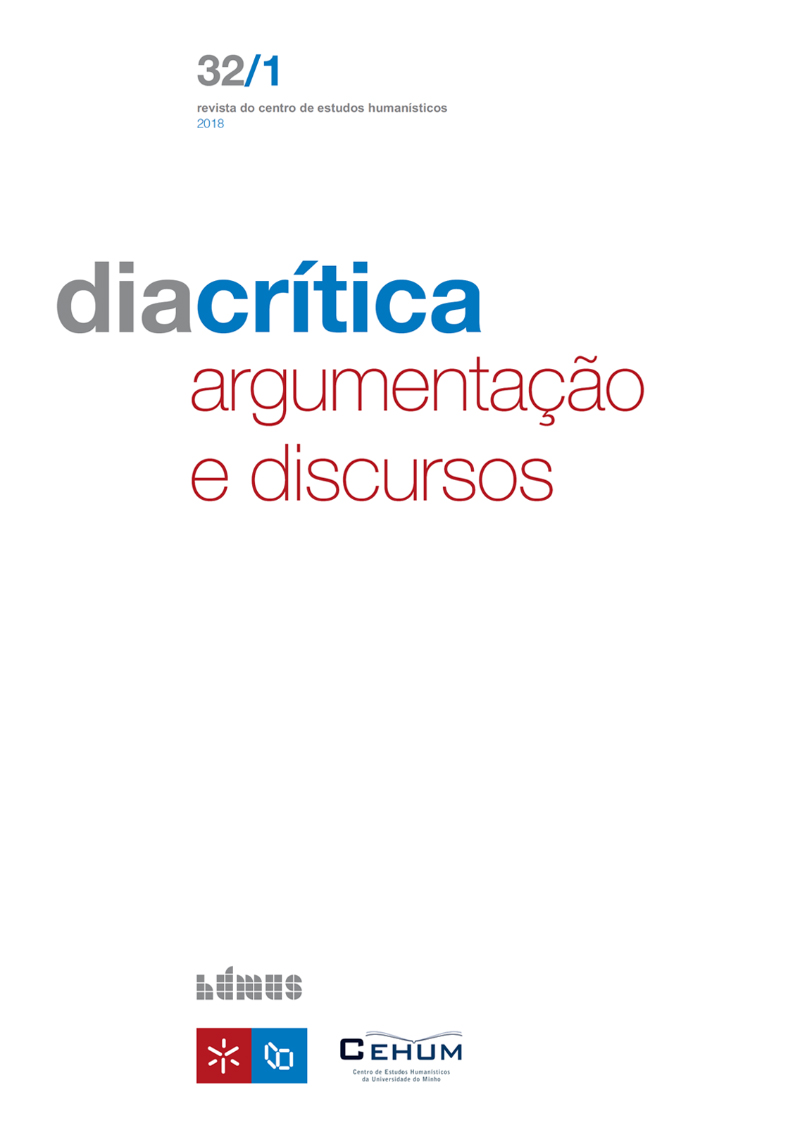Polemic and argumentation: possible interfaces within political media-texts
DOI:
https://doi.org/10.21814/diacritica.5012Keywords:
polemic, text linguistics, discourse, argumentation, linguistic categoriesAbstract
This article focuses mainly on a socio-cognitive-discursive perspective for the study of argumentation in texts, in order to reflect on the way in which the polemic (Amossy 2017; Charaudeau 2017) in its argumentative aspect is materialized within political media-texts. To achieve this goal, media-texts that show opinions about the dismissal of the current President of Brazil – Michel Temer – in the Brazilian media were selected. Preliminary studies at test to relevance of Text Linguistics analytical categories in order to analyze the argumentative procedures or argumentative strategies (Amossy, 2017) present in polemical texts. We argue that Text Linguistics, when considering that the interlocutors are social agents, may suppose the existence of two types of argumentation that may even be concomitant in verbal interactions: one based on agreement and the other on dissensus and the polemic may be associated with dissensus.
References
Adam, J.-M. (2017). Les Textes: types et prototypes. Paris: Armand Colin.
Amossy, R. (2017). Apologia da polêmica (Trad. de Mônica Cavalcante et alii). São Paulo:Contexto.
Amossy, R. (2012). L’Argumentation dans le discours. Paris: Armand Colin.
Amossy, R. (2011). Argumentação e Análise do Discurso: perspectivas teóricas e recortes disciplinares (Trad. Eduardo Lopes Piris e Moisés Olímpio Ferreira). EID&A – Revista Eletrônica de Estudos Integrados em Discurso e Argumentação, 1, 129-144.
Amossy, R. (2005). Rhétorique et analyse du discours. Pour une approche socio-discursive des textes. In J.-M. Adam & U. Heidmann (Orgs), Sciences du texte et analyse de discours. Enjeux d’une interdisciplinarité (pp. 163-179). Genève: Slatkine érudition.
Amossy, R. (2001). As modalidades argumentativas do discurso. In G. Lara, C. Auvray-Assayas & D. Delattre (Orgs), Cicéron et Philodème. La polémique en philosophie. Paris: Ed. Rue d’Ulm.
Brunschwig, J. (2003). Aspects de la polémique philosophique en Grèce ancienne. La Parole Polémique. In G. Declercq, M. Murat & J. Dangel (Orgs), La Parole polémique (pp. 25-46). Paris: Champion.
Machado, I. & Emediato, W. (Orgs) (2008). Análises do discurso hoje, vol. 1 (pp. 231-254). Rio de Janeiro: Nova Fronteira. Machado, I. & Emediato, W. (2007). O lugar da argumentação na análise do discurso: abordagens e desafios contemporâneos. Filologia e Linguística Portuguesa, 9, 121-146. DOI: https://doi.org/10.11606/issn.2176-9419.v0i9p121-146
Angenot, M. (1982). La parole pamphlétaire. Typologie des discours modernes. Paris: Payot.
Charaudeau, P. (2017). Le débat public. Entre controverse et polémique. Enjeu de vérité, enjeu de pouvoir. Limoges: Lambert-Lucas.
Declercq, G., Murat, M. & Dangel, J. (Eds). (2003). La parole polémique. Honoré Champion.
Grácio, R. A. (2013). Vocabulário crítico de argumentação. Coimbra: Grácio Editor/Instituto de Filosofia da Linguagem da Univ. Nacional de Lisboa.
Grésillon, A. & Maingueneau, D. (1984). Poliphonie, proverbe et détournement. Langages,73, 112-125. DOI: https://doi.org/10.3406/lgge.1984.1168
Kerbrat-Orecchioni, C. (1980). L’enonciation de la subjectivité dans le langage.
Paris, Colin.
Maingueneau, D. & Charaudeau, P. (2014). Dicionário de análise do discurso (3.ed., 1ª reimpressão). São Paulo: Contexto.
Perelman, Ch. & Olbrechts-Tyteca, L. (2005). Tratado da argumentação: a nova retórica. Trad. Maria Ermantina de Almeida Prado Galvão. 2.ed. São Paulo: Martins Fontes.
Plantin, Ch. (2003). Des polémistes aux polémiqueurs. In G. Declercq, M. Murat & J. Dangel (Orgs), La Parole polémique (pp. 377-408). Paris: Champion.
Pinto, R. (2010). Como argumentar e persuadir? Prática Política, Jurídica, Jornalística. Lisboa: Quid Juris.
Downloads
Published
How to Cite
Issue
Section
License
Copyright (c) 2023 Mónica Cavalcante, Rosalice Pinto, Mariza Brito

This work is licensed under a Creative Commons Attribution-NonCommercial 4.0 International License.










